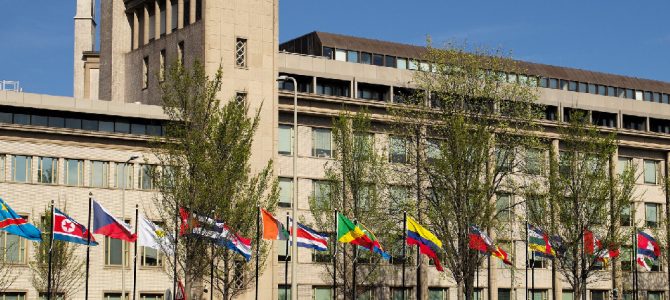
Whenever a private American citizen talks to someone in a foreign government—as Gen. Michael Flynn was accused of doing before his resignation as national security advisor—political adversaries start tossing around the accusation that the conversation violated the Logan Act. That makes for good headlines, but the real danger in foreign policy is not people playing diplomat, but plaintiffs dragging the courts into their personal issues with foreign governments.
The Logan Act, enacted in 1799 and never enforced, purports to make it a crime for an American citizen to attempt to influence a foreign government without our government approving of it. It was passed because Congress was annoyed at George Logan, a pacifist who was trying to better relations with Revolutionary France, and it is generally considered unconstitutional. But that will not stop politicians and pundits from throwing it around in the continuing and bipartisan effort to make political opposition criminal.
It may be petty and vindictive to want to jail people for visiting foreign leaders, as Nancy Pelosi famously did when she met with Bashar al-Assad in 2007, but it hints at an understandable policy: that only the executive branch should conduct the foreign policy of the United States. The Constitution grants the executive those powers. As the Supreme Court held in United States v. Curtiss-Wright in 1936, “In this vast external realm, with its important, complicated, delicate and manifold problems, the President alone has the power to speak or listen as a representative of the nation.”
Commandeering Courts Into Personal Politics
The larger problem today is not congressmen or pacifists conducting foreign policy on their own hook, it is private citizens using the court system to make their own private diplomatic statements. The problem began in the 1980s when activists unearthed another obscure eighteenth-century statute, the Alien Tort Claims Act (ACTA,) and used it to sue foreign governments for offenses committed in foreign countries against their own citizens because the acts were deemed to be against international law.
International crimes when ACTA was written were essentially restricted to piracy and mistreatment of ambassadors, but after World War II the list grew to include many other things deemed offenses against all mankind (in the first modern ATCA case, Filártiga v. Peña-Irala, the crime alleged was torture by the government of Paraguay).
In the 2004 case of Sosa v. Alvarez-Machain, the Supreme Court reigned in the scope of ATCA, but many people (and their lawyers) still wanted to use the courts to mete out justice when they thought the federal government’s diplomatic arm was not acting quickly or strongly enough. Congress agreed, and in 2016 helped to more thoroughly mangle this already twisted area of law by passing the Justice Against Sponsors of Terrorism Act (JASTA).
Congress acquiesced in the idea, held by many populists on both the Left and the Right, that our government is treating Saudi Arabia too well, and they have not been properly punished for their role in the September 11 terrorist attacks. What that role is, exactly, is a matter of debate depending on how many conspiracy theories you believe.
We know for a fact that the majority of the hijackers in that attack were Saudi citizens, but lack certainty about any greater nexus between that government and its terrorist sons. It is generally held in certain corners of the Internet fever swamps, however, that the Saudi kingdom’s involvement goes much deeper, despite the 9/11 Commission’s findings to the contrary.
Victims’ lawsuits against the Saudi government had failed in the past, because the law at the time held that Americans could only sue a foreign government for damages caused by terror attacks if the State Department listed that government as a state sponsor of terrorism. That list currently includes just three nations: Iran, Sudan, and Syria; Saudi Arabia has never been on it.
The State Department, whether run by Republicans or Democrats, has found no evidence that would require such a designation, but the absence of evidence only fuels belief in a conspiracy theory, and the demand for a lawsuit—helped, not incidentally, by Saudis’ vast wealth that makes them a juicy target—continued unabated. Election years often make for bad legislation, and 2016 was no exception.
Deserved Pity Shouldn’t Bestow Special Legal Privileges
As the American Lawyer reported in December, senators Lindsey Graham and John McCain proposed an amendment to the pending bill that would have confined liability to governments that “knowingly” engage with a terrorist organization, but their fellow senators rejected it. Congress feared being on the wrong side of 9/11 victims and their relatives, a group that has (and deserves) the public’s sympathy, so it caved and passed JASTA by voice votes in both houses. After President Obama wisely vetoed it, Congress overrode the veto by overwhelming margins, because voting against 9/11 widows is the stuff negative campaign ads are made of, and this ill-considered bill became a law.
The unintended consequences began almost immediately. As Britain Eakin reported for Courthouse News earlier this month, anti-Israel activists are using JASTA to sue that government, claiming that Israel has committed war crimes, genocide, and ethnic cleansing against Arabs in the West Bank (the case is Peled et al. v. Netanyahu, filed in federal district court in DC). The complaint strings together the usual anti-Israel conspiracy theories to form a legal theory with far too weak a connection to permit American courts to adjudicate it. Or, that would have been the case until JASTA. Now, any radical’s claims against foreign enemies real or imagined are serious enough to get into court, if not to win the case.
Interactions between governments should be conducted carefully and in ways those governments have approved. With JASTA, Congress has allowed any citizen who can afford the filing fees to bring the weight of the judicial branch into his arguments with foreign sovereigns. That this would be misused was entirely predictable. Congress should work to fix its mistake before it is too late.









